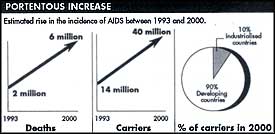Thirst for profits rises as disease spreads
 WITH PREDICTIONS by World Health Organisation officials that 40 million people will be infected by HIV by 2000 and six million of them will go on to contract AIDS and die, a cure for the disease holds out promise for vast profits -- and the Australians, at least, are determined not to be deprived of their rightful share.
WITH PREDICTIONS by World Health Organisation officials that 40 million people will be infected by HIV by 2000 and six million of them will go on to contract AIDS and die, a cure for the disease holds out promise for vast profits -- and the Australians, at least, are determined not to be deprived of their rightful share.
Rather than sign a standard contract, offered by the US National Cancer Institute (NCI) to countries in which its collectors hunt medicinal plants, Australian officials are holding out for a deal that contains built-in protection for plants in the wild, a role for Australian scientists in research and development and a guarantee of a "fair and equitable share" of any commercial benefits from the development of a plant.
The plant concerned is a common Western Australian shrub belonging to the genus Conospermum, collected by US botanist Richard Spjut. NCI researchers have isolated an alkaloid from the woody plant, which halts replication of HIV and have applied for a patent on the chemical, which it calls conocurvone.
NCI deputy director Dwight Kaufman concedes this is the first time that the institute is negotiating a substitute for its standard contract, explaining this is because conocurvone is "extraordinarily exciting". He says of more than 7,000 plants studied, Conospermum is the fourth found to act against HIV, though NCI has yet to test its safety in humans. The other three plants are from Samoa, Sarawak and Cameroon.
Meanwhile, report from South Africa confirm AIDS is spreading fast in the republic, with the government estimating that more than 300,000 persons are infected and the total is doubling every 12 months. Government researchers say the disease is spreading fastest in the black population and more women are infected than men.
Widespread ignorance A survey in the sprawling black township of Soweto reveals widespread ignorance of the disease, with many of the residents firmly believing that AIDS is curable, that herbal medicines can protect against the virus and that only adults can contract the disease. And, complicating the task of spreading awareness of AIDS is the fact that almost half the black population cannot read a newspaper and only 20 per cent of them are exposed to television because most households lack electricity.
